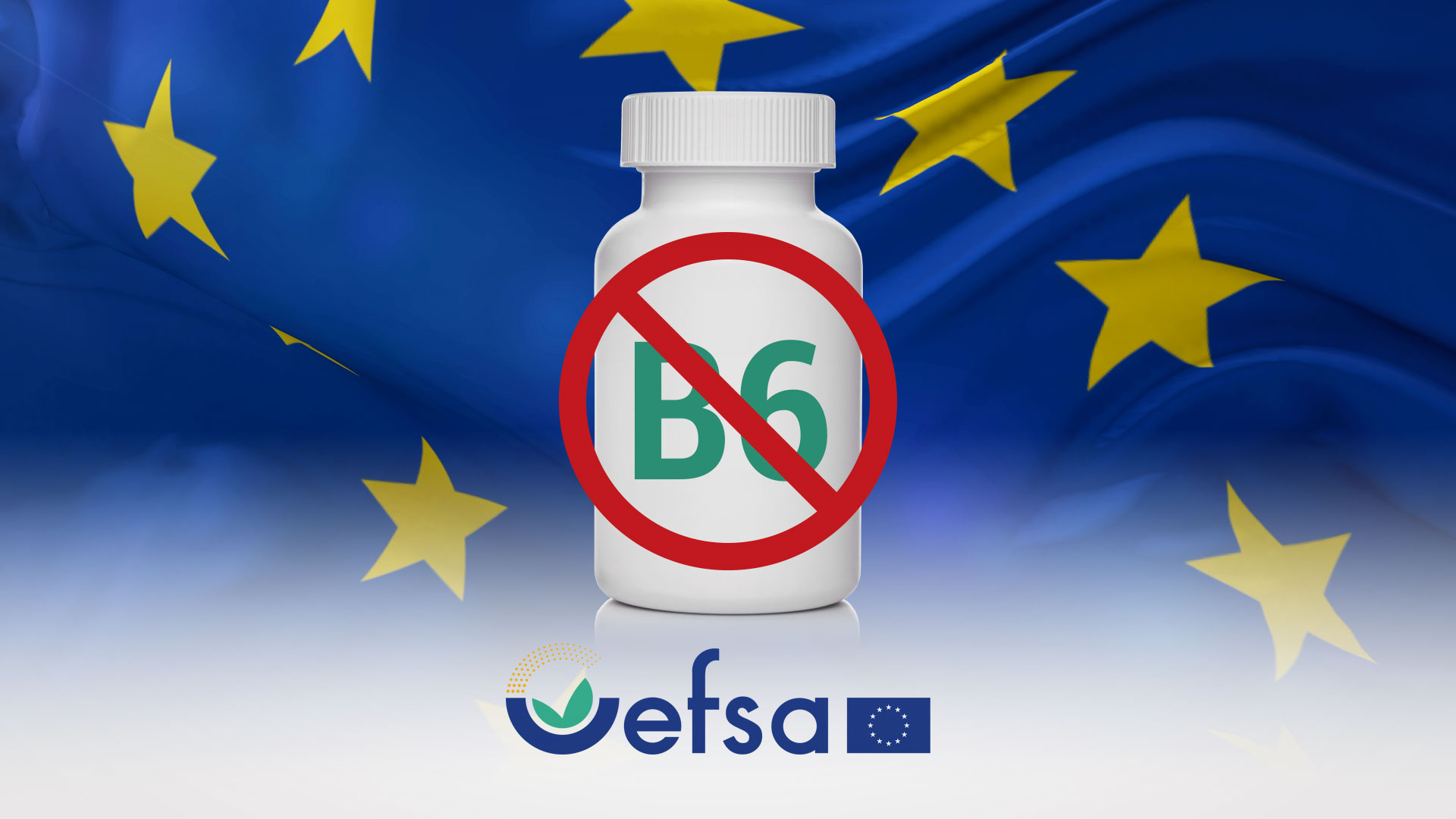Content Sections
European and UK authorities have shown their intent to ban high(er) dose vitamin B6 since the 1990s, despite decades of evidence that it has multiple benefits, including through its role in increasing energy levels, reducing homocysteine, so lowering the risk of heart disease and Alzheimer's, relieving premenstrual symptoms, improving mood, reducing depression, and reducing lung cancer risk.
The battle between the drug and supplement industries continues to be fought as those who use high dose vitamins are less likely to take drugs. The FDA has long attempted to classify the bioactive, coenzyme form of B6 - that has never been associated with any risks (regardless of dosage) - as a drug.
The difficulty for many of us users of high dose B6 is that we can't just switch to a drug form if the supplement forms are banned. That's because there are very few (and sometimes no) high dose B vitamin drugs available - especially ones containing 20 mg or more of B6. This means if high dose supplements are axed, natural health choice for the European consumer simply disappears altogether and people will find it ever harder to create and regenerate their health independently of the system.
After an already very low 'tolerable upper level' (TUL) of 25 mg for vitamin B6 was set by the European Commission's Scientific Committee on Food back in 2000, the predecessor of the European Food Safety Authority (EFSA), has this month taken a big step forward in facilitating a ban on high dose vitamin B6.
Given that EFSA's remit is taken from the European Commission, EFSA itself can't impose a ban itself. What it can do, however, as the "highest authority" on food in the EU, is give advice to the European Commission and to the Member States. Advice that's so powerful it tends to stand up in the European Court as if it were the word of God.
On 13 January 2023, EFSA published its draft opinion that reduces the 25 mg TUL to a meagre 12.5 mg. That won't set the limit for supplements, because what the EU authorities like to do is take the TUL value derived by the boffins at EFSA, then subtract the highest intakes the public are likely to consume from food, based on dietary surveys. Then you'll land up with a value that's less than 10 mg - which won't be any good if you're actually interested in doing something as useful as lowering your heart disease, Alzheimer's or cancer risk.
Below you'll find our response to EFSA submitted prior to the close of its one month consultation on 10 February. You'll also see our press release issued yesterday.
So what next?
There are three main options:
- EFSA takes note of the consultation responses we and others have submitted and revises its opinion, reverting at least to the already low 25 mg TUL. This has not in any way been shown over the last 20 years to lead to consumers in the EU experiencing pyridoxine induced neurotoxicity, the alleged concern. Note that there is a history of EFSA ignoring consultation inputs if it means its opinion will be revised in the direction of increasing leniency or freedom of choice. Central to rejecting EFSA's proposal is the work that we at ANH have led over the last 12 years in developing a risk/benefit, as compared with a risk only, approach (see our consultation response for more information).
- EFSA limits its restrictive opinion to only the one vitamer of B6 that has been associated with peripheral neurotoxicity, namely pyridoxine. Remember there is only evidence of this for pyridoxine (e.g. in its common hydrochloride form) when people have consumed very high intakes (generally over 1000 mg per day) over long periods (months or years). This would leave the bioactive form, pyridoxal 5'-phosphate (PLP or P5P), free from the new limit.
- A legal challenge is made against the European Commission or member states (within 3 months of passage of the law) if very low maximum limits are imposed either by EU member States or the European Commission if it proceeds with harmonisation of maximum permitted levels (MPLs). Such a challenge would be particularly valuable if the new MPLs also impacted the PLP form.
In the video below, ANH founder and scientific director of ANH Europe, Rob Verkerk PhD, summarises some of the issues facing vitamin B6 owing to EFSA's latest draft proposal for a revised TUL.
Find out more about EFSA's consultation and download our consultation response at the links below:
>>> EFSA public consultation announcement on vitamin B6:
https://connect.efsa.europa.eu/RM/s/publicconsultation2/a0l09000006qMHZ/pc0353
>>> ANH Europe’s consultation response to EFSA’s consultation can be downloaded at the following link:
https://www.anhinternational.org/resources/documents/230210-anh-b6-consultation-response/
Our press release, issued yesterday, summarises some of our concerns.
Press Release
Press Release by ANH Europe
For immediate release
16 February 2023
EUROPEAN UNION PREPARES
TO BAN HIGHER DOSE VITAMIN B6
The proposed ban will limit freedom of choice and prevent the vitamin’s use in reducing Alzheimer’s risk and symptoms of premenstrual syndrome
European authorities have moved another step closer in an attempt to greatly limit the daily amounts of vitamin B6 that consumers in the EU will be able to access in food supplements.
Last Friday night (10 February), the European Food Safety Authority (EFSA) closed a public consultation that was open for only a month. The consultation sought comments on its proposal to reduce the Tolerable Upper Level for vitamin B6, the maximum daily amount deemed safe for long-term use from all sources (i.e. food and supplements), to a paltry 12.5 mg per day. This proposed new level is half the previous level set by the EFSA’s predecessor, the Scientific Committee on Food. It is also just one eighth of the amount deemed safe (100 mg/day) by the US equivalent, the National Academy of Medicine. In its consultation response, the Alliance for Natural Health (ANH) Europe has highlighted gross irregularities in the scientific process being used by EFSA.
Scientific director, Robert Verkerk PhD, said,
"The remit given to EFSA by the Commission was to review the level based on new science and methodologies. Instead, EFSA ignored new methodologies and used old, discredited, or irrelevant science, including an old study on five beagle dogs conducted over 45 years ago."
Dr Verkerk added,
"Not only that, EFSA wants to apply this new level to all forms of vitamin B6 to protect people from any risk of peripheral neuropathy, despite this only having been linked to one form – pyridoxine – and then only when megadoses of 1000 mg have been taken over extended periods."
ANH Europe asserts that it would be legally disproportionate if EU member states or the European Commission attempt to lower levels of all forms, especially the bioactive, coenzyme, pyridoxal 5’-phosphate form, based on this reduced TUL.
Director of ANH Europe, Dr Nick van Ruiten, voiced grave concern over EFSA’s proposal, commenting,
"This is part of a very slippery slope for free choice and self-care in the EU. On the back of a conclusive body of science showing that higher dose B6, B12, folate and Omega-3 fatty acids lower the risk of cognitive decline and Alzheimer’s, as well as thousands of women relying on B6 to relieve their PMS symptoms, EFSA’s proposal is nonsensical. Especially in view of the huge amount of data on the vitamin’s safety, especially when used in the coenzyme form."
ANH Europe, and other organisations which criticised EFSA’s proposal, are hopeful that some adjustments will be made to EFSA’s final opinion. If not, this could soon lead national regulators to further lower their own limits. The European Commission has indicated its intention to push ahead with the harmonisation of vitamin and mineral levels across the EU, a plan that’s been on the drawing board since the passage of the EU Food Supplements Directive in 2002. ANH Europe’s consultation response to EFSA can be downloaded below. END.
CONTACT
Please contact Melissa Smith by email or telephone if you require any further information:
Email: [email protected]
Telephone: +44 1483 362200
About Alliance for Natural Health Europe
Alliance for Natural Health (ANH) Europe is the European, Netherlands-based representative of the ANH International, an internationally active, UK headquartered, non-profit organisation founded in 2002 that seeks to protect and promote natural and sustainable approaches to health care. We support approaches to self-care and health care that work with, rather than against, nature. Members of our alliance include health professionals, scientists, lawyers, natural product companies and members of the public.
This issue to limit public access to high dose vitamin B6 is going to demand action by citizens.
The nature of this action can only be determined once we have see how EFSA will respond to the consultation.
If you haven't already, please sign up for our free newsletter or become a member, and stay informed, so we can help mobilise citizens across the EU when we know what actions are needed in order to protect our freedom of choice and our right to natural health.








Comments
your voice counts
17 February 2023 at 5:33 pm
What about those of us, including myself, who suffer from pyroluria? It's something you inherit from your parents, and we have to take B6, zinc and I've just learnt magnesium, to avoid cancer and heart attacks. Excessive numbers of pyrroles are produced which strip your body of B6 and zinc. These are needed in over 100 enzyme reactions, the brain, immune function etc. You cannot be well if you haven't got enough. Pyroluria affects people when they're stressed, but I found from a test I was affected even when I wasn't stressed. Taking high dose vitamin B6 away from us is criminal and not the action of a democratic and civilised society.
20 May 2024 at 10:47 pm
This article isn’t even correct. Very small amounts of B6 are causing severe nervous system problems in many people and many times it is permanent. 1000mg a day? NO. It’s happening at 50, 25, and even 10 mg or less. The fact that the EU actually did something about it is impressive. If you want to take massive doses for your “freedom”. Buy a bottle and take multiples but this was put in place to protect people. Finally.
21 May 2024 at 4:42 pm
Thanks for your response, but it is at odds even with evidence being used by EFSA to establish a 12.5mg UL for vitamin B6. If you have data or evidence that people are experiencing neurological symptoms from under 100 mg of any form of vitamin B6, might you please provide this? We are unaware of any evidence for this, including from Orthomolecular doctors who have prescribed daily doses exceeding 100 mg for decades. The UL has been established based largely on an old study on beagles and then use of high uncertainty factors given the translation to humans. We are particularly interested in protecting the availability of higher dosages of the pyridoxal-5’-phosphate, the bioactive form of B6, over which there are no data of neurological adverse effects at any dose tested. Thank you in advance for any data or evidence you can provide. Please email [email protected] with the subject Vitamin B6.
Your voice counts
We welcome your comments and are very interested in your point of view, but we ask that you keep them relevant to the article, that they be civil and without commercial links. All comments are moderated prior to being published. We reserve the right to edit or not publish comments that we consider abusive or offensive.
There is extra content here from a third party provider. You will be unable to see this content unless you agree to allow Content Cookies. Cookie Preferences